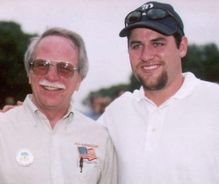Selling gold at auction best way to a fair price.
Gold Warning – Sellers Beware!
Would you accept only $60
when selling a gold item that’s actually worth $10,000? Yet, that
unscrupulous “low ball” offer actually was made.
In recent years I’ve provided award-winning expert assistance for
newspaper and TV undercover investigations of so-called “hotel buyers”
operating in a half dozen states. You’ve undoubtedly seen the big
advertisements proclaiming, “HIGHEST PRICES PAID,” that are placed by
some of the itinerant buyers of gold and silver jewelry and coins who
travel from city to city. In some cases, those ads should state,
“SELLERS BEWARE,” because you may see bigger promises than payouts.I loaned $43,000 worth of rare coins, bullion and “scrap” gold (such as broken jewelry) for undercover reporters to offer various hotel buyers to test buying prices. Even though some of the buyers actually referred to price guides or looked up information on laptop computers before making an offer, they often made offers significantly below the melt value of rare coins that had a numismatic value far above their bullion content.
When asked by a reporter how much he’d pay for the $43,000 worth of items, one buyer offered only $11,600 for everything. That’s about 25 cents on the dollar. Another buyer offered just $30 for a 14k gold bracelet with a melt value of about $350. And another traveling buyer, the one who offered only $60 for a rare, mint state 1925-dated Denver Mint Quarter Eagle ($2.50 denomination U.S. gold coin) valued at $10,000, made an offer of only $680 for $25,000 worth of certified rare coins. That’s only about three percent of their actual, easily determined value, and that would be a financially devastating loss to any unwary seller.
In addition to not paying fair market value for rare coins, bullion and jewelry, some of the traveling gold buyers refuse to give receipts so you have no proof of the cash transaction if you later want to dispute it. The scales used by some of the buyers to weigh gold jewelry may not have been lawfully registered with government agencies to test their accuracy. That could result in underweight measurements when someone is selling their gold. In fact, some traveling buyers may not even be registered with the state or local coummunity in which they’re temporarily setting up, and may not be complying with government registration procedural requirements or cooperating with local law enforcement agencies. Sellers beware!
The results of those investigative stories are not necessarily indicative of all hotel buyers across the country, but they certainly raise the question: how do you protect yourself when you want to sell coins or jewelry?
First, prepare in advance. Know beforehand what you are selling and get more than one offer, preferably in writing. Consult with local merchants in your community who may not have flashy advertising, but who may offer you considerably more money for your coins and jewelry. Most legitimate coin dealers will offer 70 to 80 percent of melt value for jewelry; certainly not merely 10 percent as one traveling hotel buyer offered.
Remember: if you don’t know gold and coins, you’d better know your gold and coins dealer. Check the buyer’s rating with the Better Business Bureau (www.BBB.org).
Mike Fuljenz is the editor of the Numismatic Literary Guild (NLG) award winning “Michael Fuljenz Metals Market Weekly Report,” and the numismatic consultant for First Fidelity Reserve. His award winning radio show can be heard on KLVI News Talk AM 560 from 6 p.m. to 7 p.m. CST on the last Monday of the month.



No comments:
Post a Comment